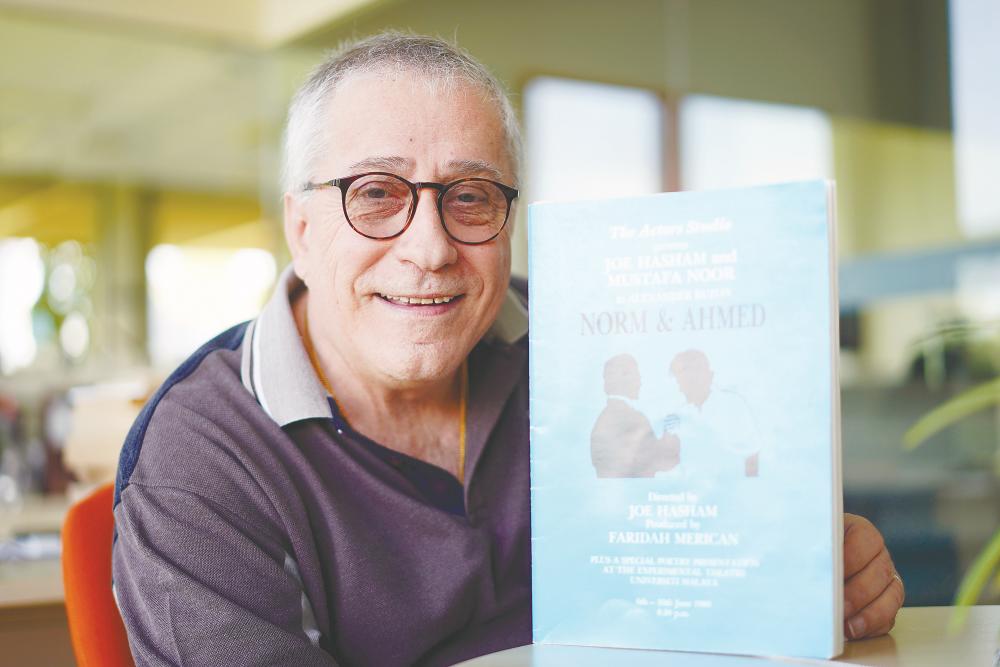IT CANNOT be denied that husband-and-wife team Joe Hasham and Datuk Faridah Merican, who set up The Actors Studio in 1989, have done many great things to uplift the Malaysian theatre scene.
This year, The Actors Studio will be celebrating its 30th anniversary, with more than 600 productions staged.
To celebrate the anniversary, the couple are re-staging the very first play they produced under The Actors Studio label.
The production is Alex Buzo’s ground-breaking Norm and Ahmed. The 50 minute-long play starts on a deserted street in Australia, where one man asks another: “Got a light?”
The play focuses on two strangers, an Australian blue collar worker named Norm, and a Pakistani student named Ahmed who engage in a conversation where they talk about their dreams, desires, disappointments, and of course, their skin colour.
During the 1989 Malaysian production of Norm and Ahmed, Joe both directed the play and played the role of Norm. The late Mustafa Noor played the role of Ahmed.
At the time, playwright Buzo even flew from Australia to see the Malaysian production, where he was delighted by the positive audience reaction.
In the latest re-staging, Joe is in the director’s seat once again, while multi award-winning Australian actor Kingsley Judd stars as Norm, and Malaysian actor Phraveen Arikiah is playing Ahmed.
Judd has previously done three productions with The Actors Studio, including the critically acclaimed Someone Who’ll Watch Over Me back in 2012.
Singer-songwriter Phraveen is a rising talent, and has appeared in productions such Uda & Dara in 2015, Mahsuri & Other Peculiar Tales, and musical production Liver & Lung.
The production will be staged in The Kuala Lumpur Performing Arts Centre (klpac) from tomorrow to Feb 17.
I had a chance to sit in on the dress rehearsal, and watched the actors churn out an edgy performance which will keep you on the edge of your seat.
When it first premiered in Australia in 1968, the play was considered daring for tackling the issues of racism and prejudice.
“When the play was first staged ... it created controversy,” Joe says.
The play was banned in three states in Australia, and two of the actors were arrested, with one newspaper going as far as saying it wished the play was never performed again.
Joe explains at that time Australia was practising The White Australia policy, which aimed to exclude people of non-European origin, especially Asians (primarily Chinese) and Pacific Islanders (primarily Melanesians) from emigrating to Australia.
“It was okay for Europeans to migrate to Australia because they were white,” he says.
He describes the worst thing to happen under this policy was when the government systematically removed children from indigenous Australian homes and families, placing them in white
establishments so they would learn to “become white”.
This created a ‘stolen generation’ which had their connection to their native culture severed.
The policy, which started in 1901, was finally abolished in 1973.
“[The play] will give the audience a sneak peak at what Australia was like in 1968,” he says.
Today, the play’s impact is still felt in Australia. It is studied as part of drama classes in high schools, and is often referred to as a “culturally important work”.
Joe believes the story will spark something in the Malaysian audience, especially on dealing with race relationships.
“I have been a victim of racism,” Joe says.
The incident took place years ago where he was having a drink with his wife and his friends in Kuala Lumpur.
“A Malaysian guy asked me to go back to my country, and that I should not be taking Malaysian jobs and Malaysian women,” he says. “The conversation got nasty and confrontational.
“I have never considered myself as white. I am from Lebanon. I have been in Malaysia for the last 35 years. I regard Malaysia as my home.
“[But] we tend to judge people by their skin colour, and it is the most disgusting thing.”
To date Joe has directed more than 100 plays.
One wonders if he will ever get burnt out from directing.
“Never,” he said.
“The day [after] I hang up my director shoes, [I] will be dead. It is the people I work with who make my work exciting.”















